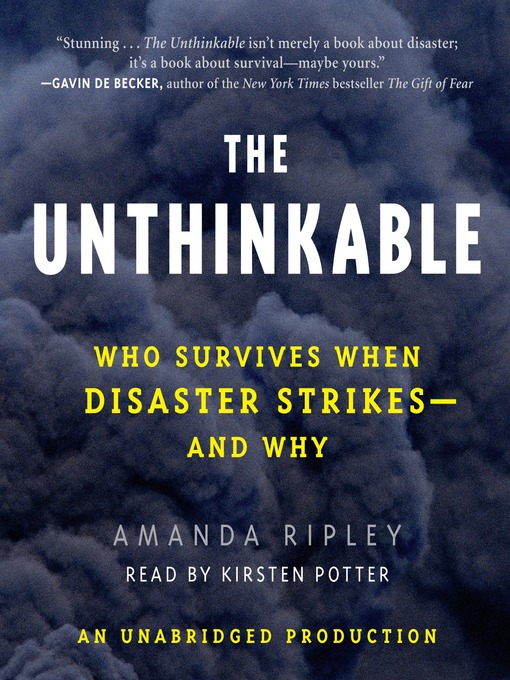The Unthinkable
Who Survives When Disaster Strikes--and Why
“Fascinating and useful . . . [shows that] the most important variable in an emergency is your own behavior.”—The New York Times
Today, nine out of ten Americans live in places at significant risk of earthquakes, hurricanes, tornadoes, terrorism, or other disasters. Tomorrow, some of us will have to make split-second choices to save ourselves and our families. How will we react? What will it feel like? Will we be heroes or victims?
In her quest to answer these questions, award-winning journalist Amanda Ripley traces human responses to some of recent history’s epic disasters, from the explosion of the Mont Blanc munitions ship in 1917–one of the biggest explosions before the invention of the atomic bomb–to the journeys of the 15,000 people who found their way out of the World Trade Center on September 11, 2001. To understand the science behind the stories, Ripley turns to leading brain scientists, trauma psychologists, and other disaster experts. She even has her own brain examined by military researchers and experiences, through realistic simulations, what it might be like to survive a plane crash into the ocean or to escape a raging fire.
Ripley comes back with precious wisdom about the surprising humanity of crowds, the elegance of the brain’s fear circuits, and the stunning inadequacy of many of our evolutionary responses. Most unexpectedly, she discovers the brain’s ability to do much, much better–with just a little help.
-
Creators
-
Publisher
-
Release date
June 10, 2008 -
Formats
-
OverDrive Listen audiobook
- ISBN: 9781415954126
- File size: 276419 KB
- Duration: 09:35:52
-
-
Languages
- English
-
Reviews
-
AudioFile Magazine
If you encounter a fire, explosion, plane crash, or terrorist attack, your chances of survival might depend on how your brain reacts or what preparations you make. Using major disasters such as 9/11, Haj stampedes, and a club fire in Kentucky as examples, Ripley examines the psychology of individuals and groups confronted with life-or-death situations. Kirsten Potter's narration is straightforward and clear. She emphasizes important words with short pauses and injects a bit of irony here and there. Above all, she catches Ripley's obvious enthusiasm for her subject. The author put herself into simulated disaster situations; Potter does likewise for listeners. J.B.G. (c) AudioFile 2008, Portland, Maine -
Publisher's Weekly
April 14, 2008
Ripley, an award-winning writer on homeland security for Time
, offers a compelling look at instinct and disaster response as she explores the psychology of fear and how it can save or destroy us. Surprisingly, she reports, mass panic is rare, and an understanding of the dynamics of crowds can help prevent a stampede, while a well-trained crew can get passengers quickly but calmly off a crashed plane. Using interviews with survivors of hotel fires, hostage situations, plane crashes and, 9/11, Ripley takes readers through the three stages of reaction to calamity: disbelief, deliberation and action. The average person slows down, spending valuable minutes to gather belongings and check in with others. The human tendency to stay in groups can make evacuation take much longer than experts estimate. Official policy based on inaccurate assumptions can also put people in danger; even after 9/11, Ripley says, the requirement for evacuation drills on office buildings is inadequate. Ripley’s in-depth look at the psychology of disaster response, alongside survivors’ accounts, makes for gripping reading, sure to raise debate as well as our awareness of a life-and-death issue. 8 pages of color photos.
-
Formats
- OverDrive Listen audiobook
subjects
Languages
- English
Loading
Why is availability limited?
×Availability can change throughout the month based on the library's budget. You can still place a hold on the title, and your hold will be automatically filled as soon as the title is available again.
The Kindle Book format for this title is not supported on:
×Read-along ebook
×The OverDrive Read format of this ebook has professional narration that plays while you read in your browser. Learn more here.


